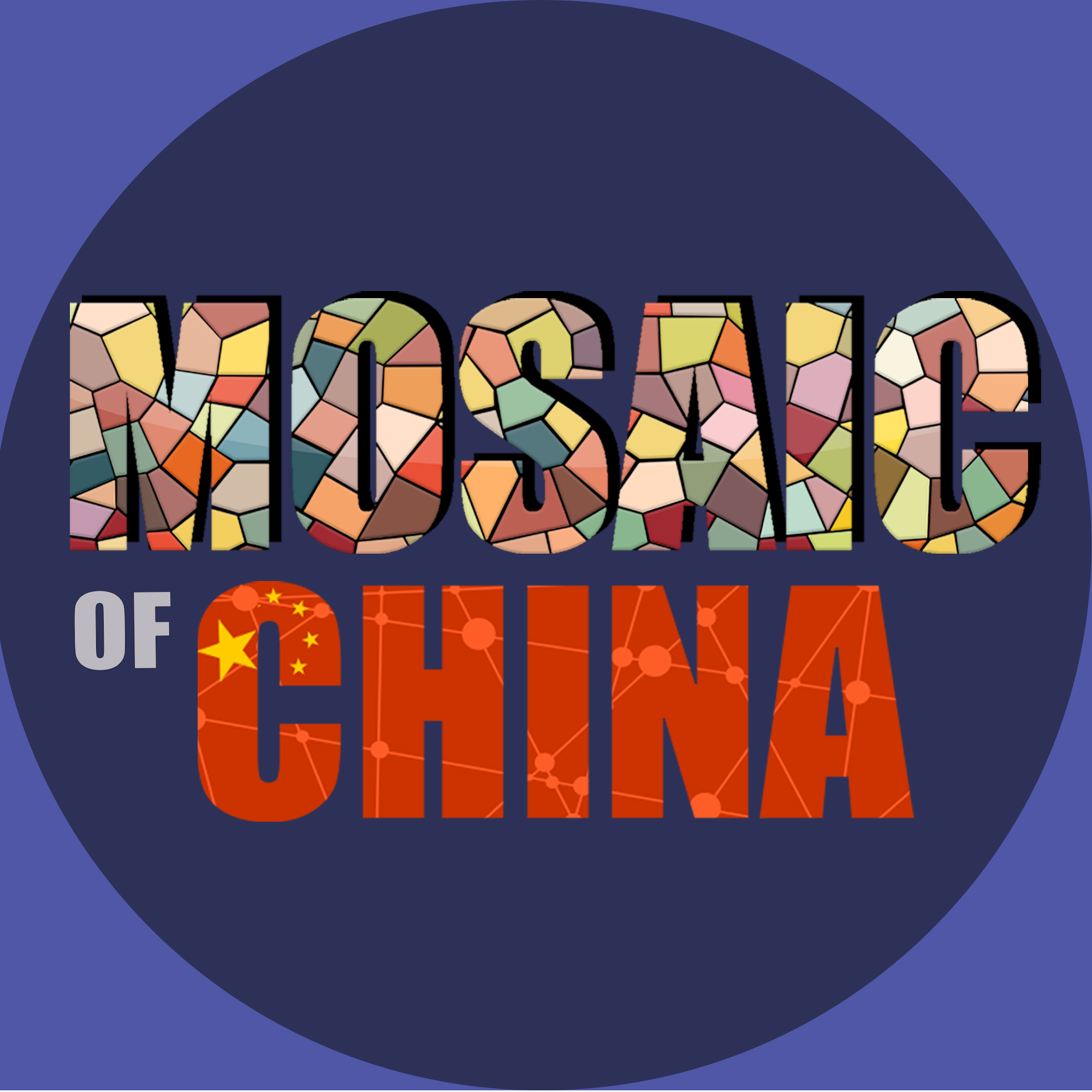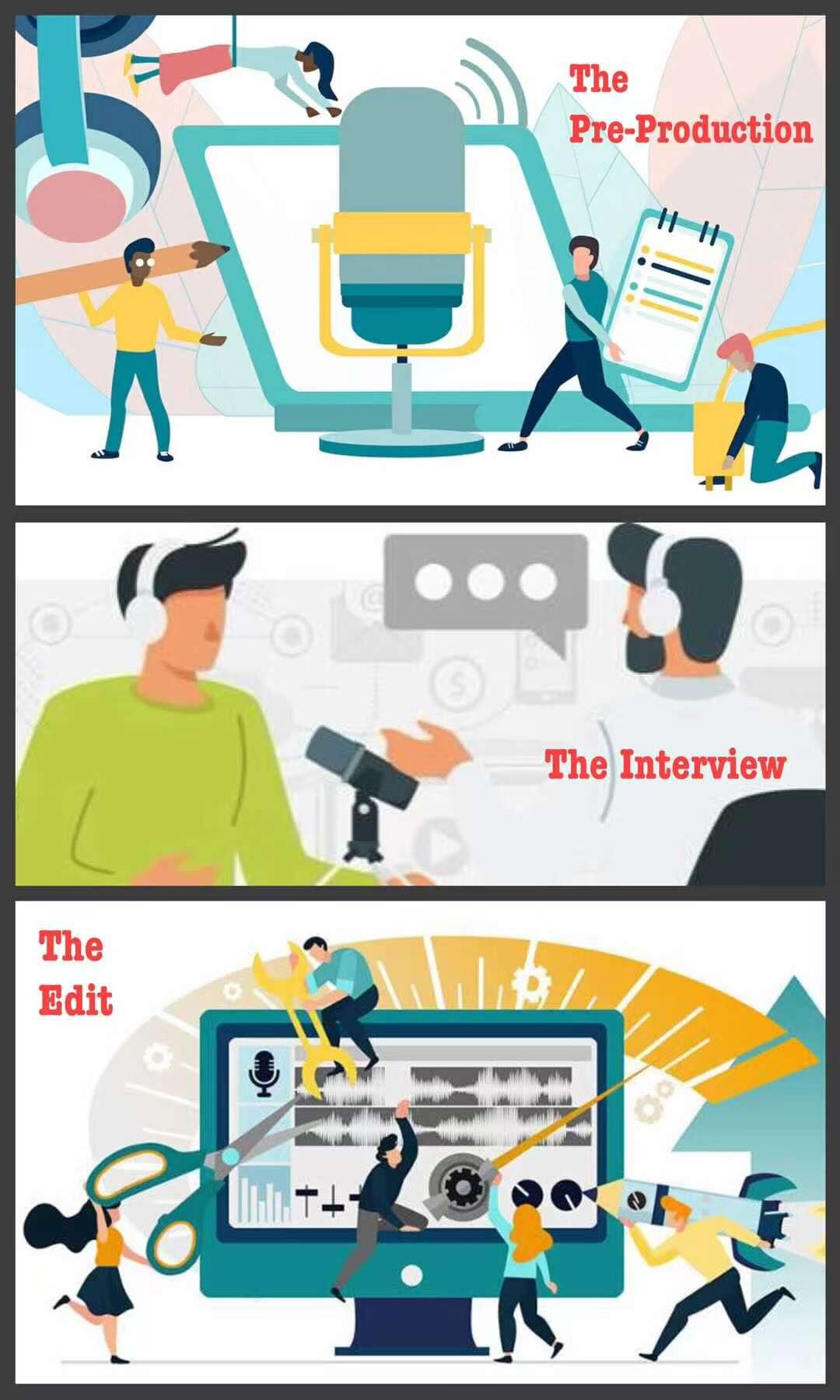Season 02 Bonus: Connectivity
The details below are for the REGULAR version of this episode. For the PREMIUM version, subscribe on Apple Podcasts, Patreon (outside China) or 爱发电 (in China).
Bonus Episode
Mosaic of China with Oscar Fuchs - ‘Connectivity’
Original Date of Release: 27 Apr 2021.
Sometimes you don't know quite what you're doing and why you're doing it, until you sit down one day and take the time to evaluate it. And that's the day you might realise that the meaning of your work has somehow morphed into something you hadn't planned.
In order to reach this realisation, it helps to be interviewed by a professional journalist! Thank you to Rebecca Kanthor for speaking with me on this special bonus episode to mark the midway point of Season 02. We discuss the ways in which Mosaic of China has evolved since its initial conception as a community that could bridge the gap between China and the rest of the world. And we throw in some fun by including some questions from a few of the Patreon/爱发电 supporters too.
To Join the Conversation and Follow The Graphics…
View the LinkedIn Post or the Facebook Album for this episode. Alternatively, follow Mosaic of China on WeChat.
To view the images below on a mobile device, rotate to landscape orientation to see the full image descriptions.
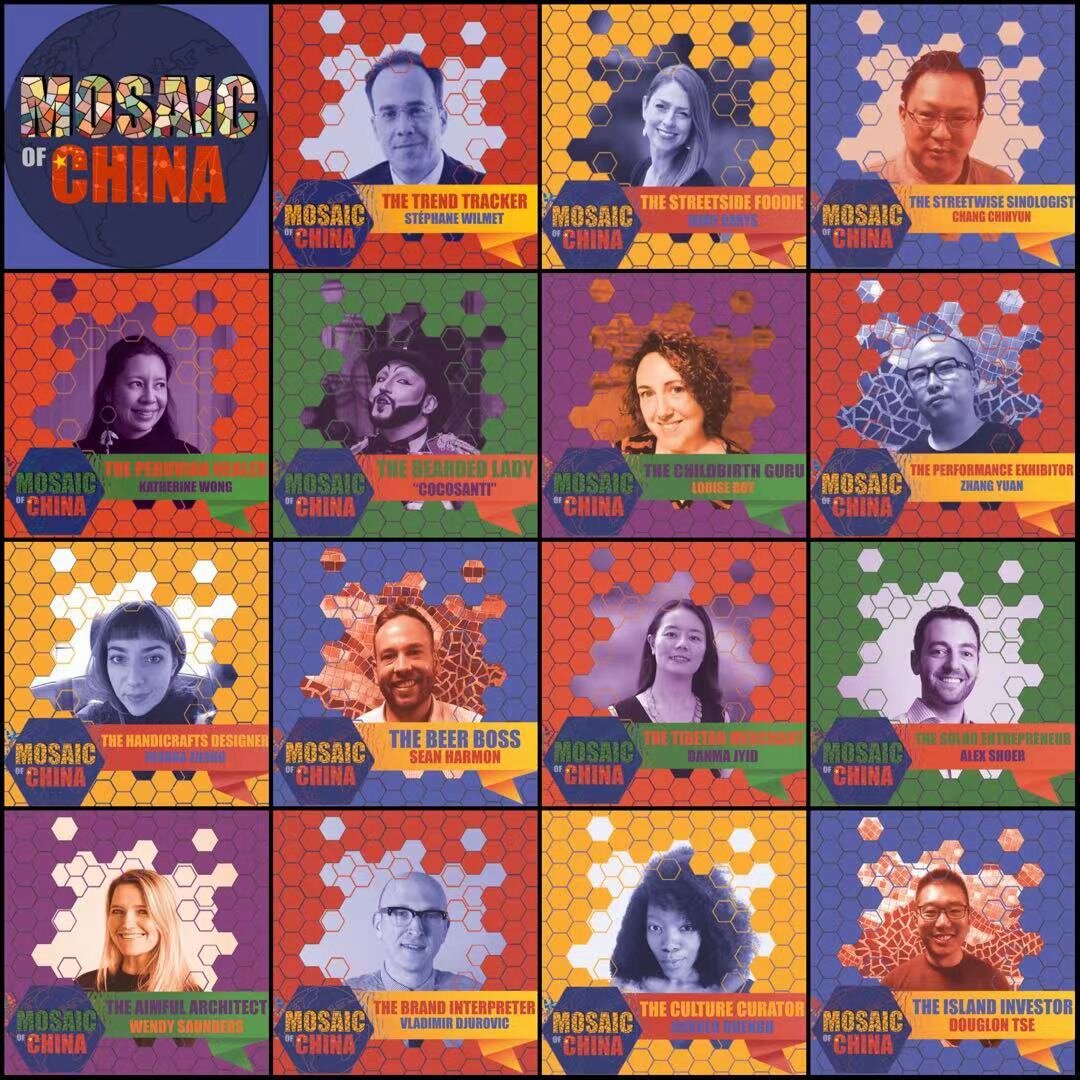
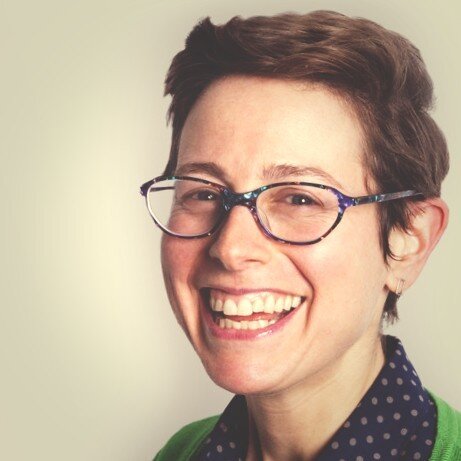
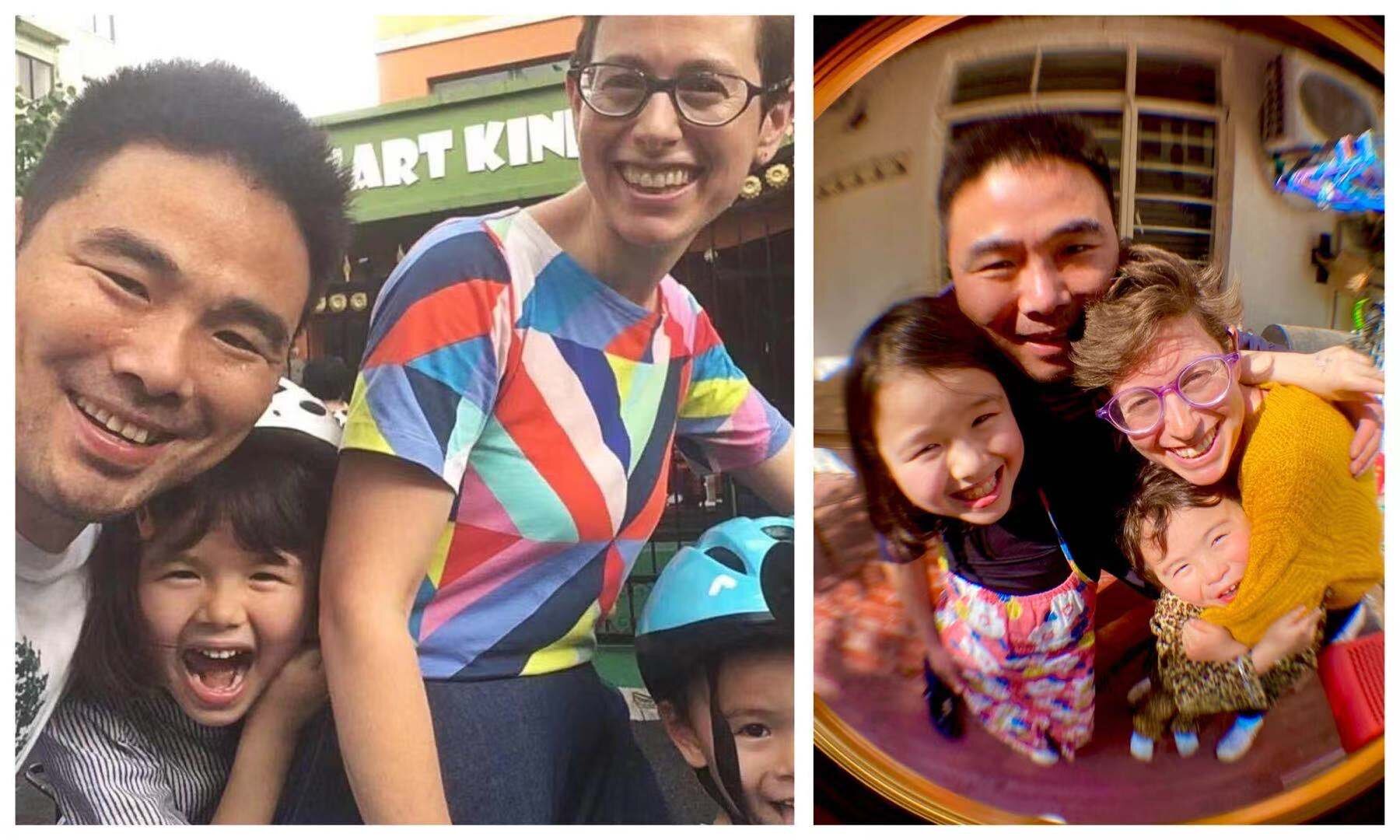
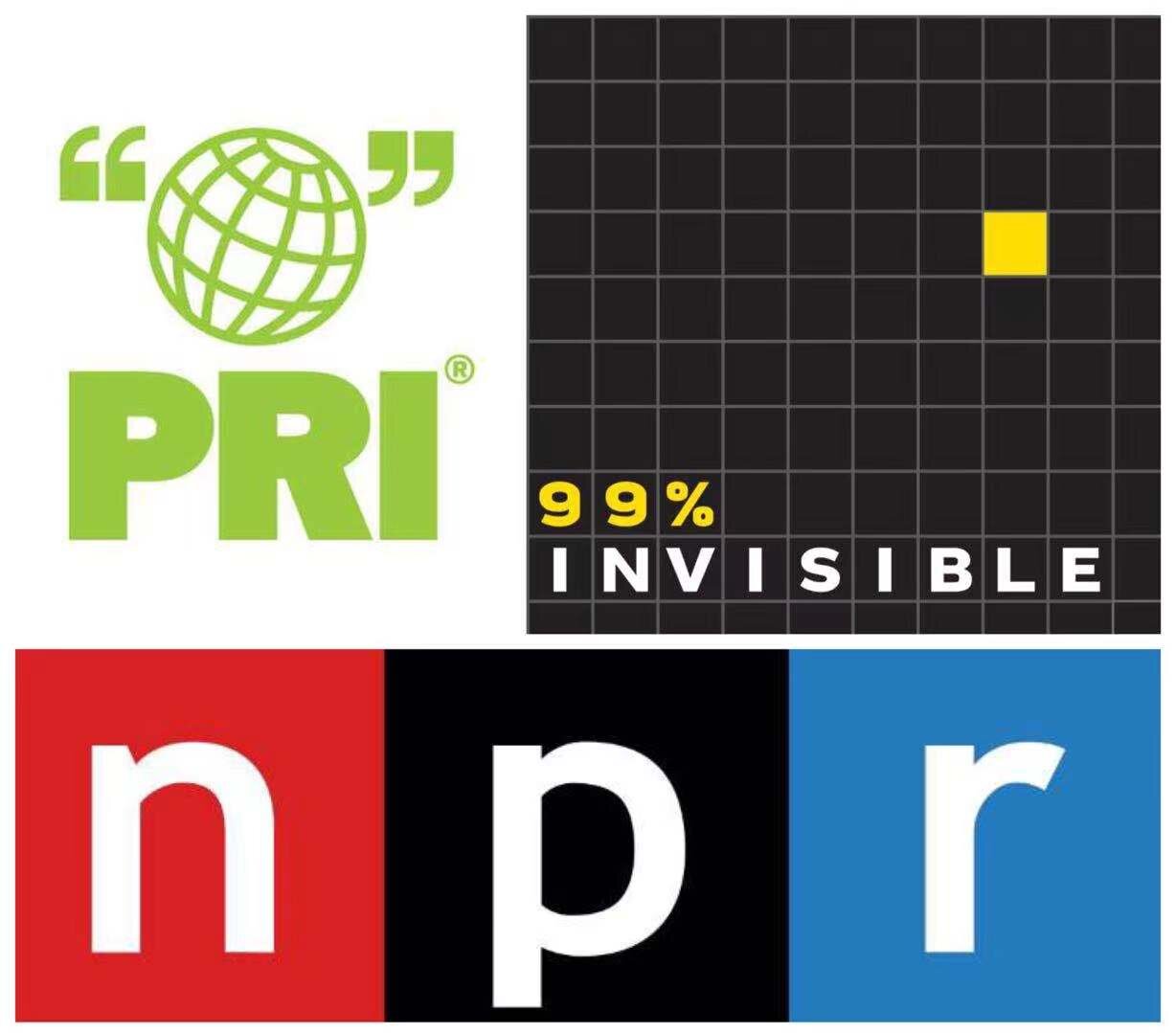
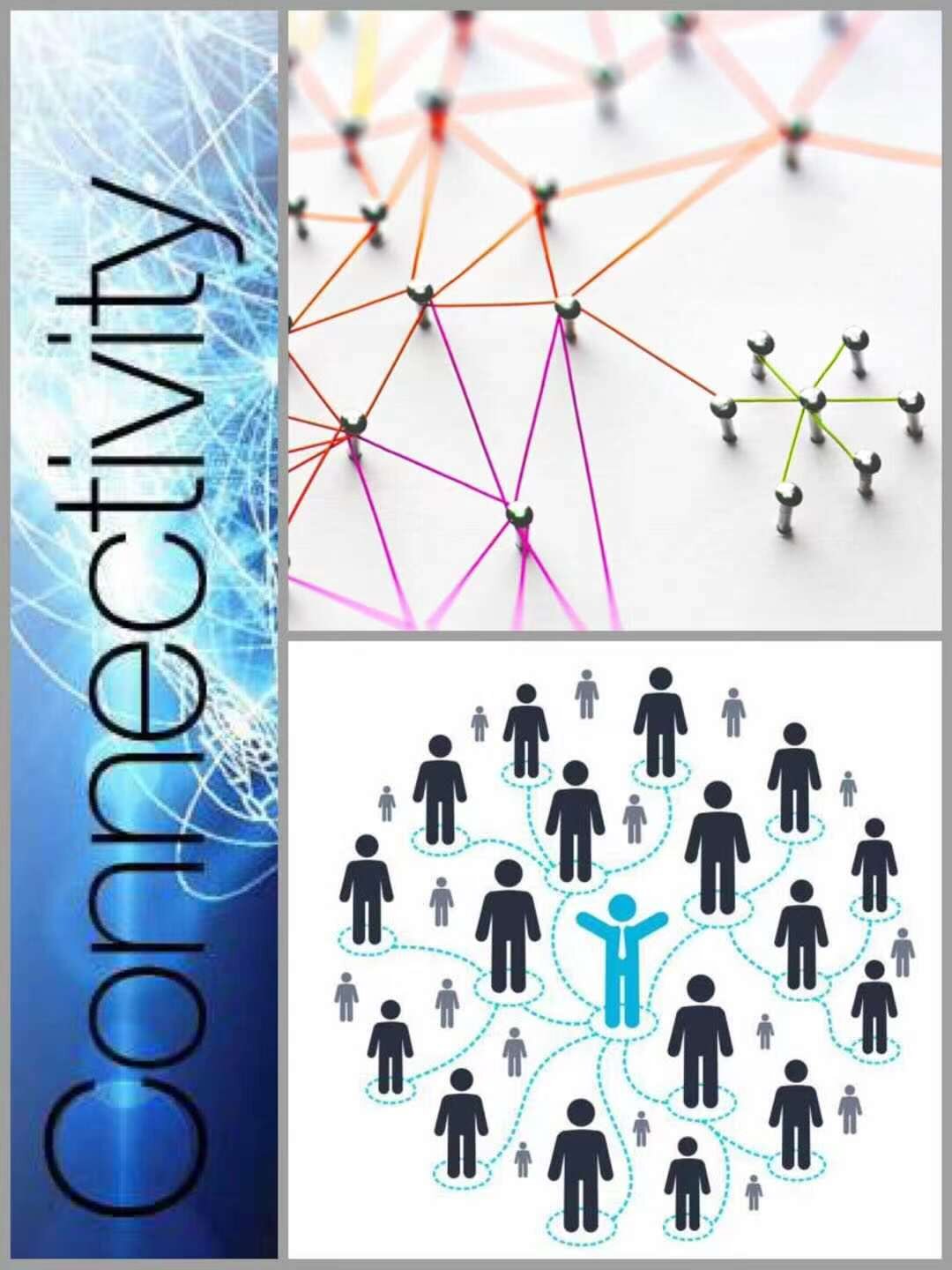
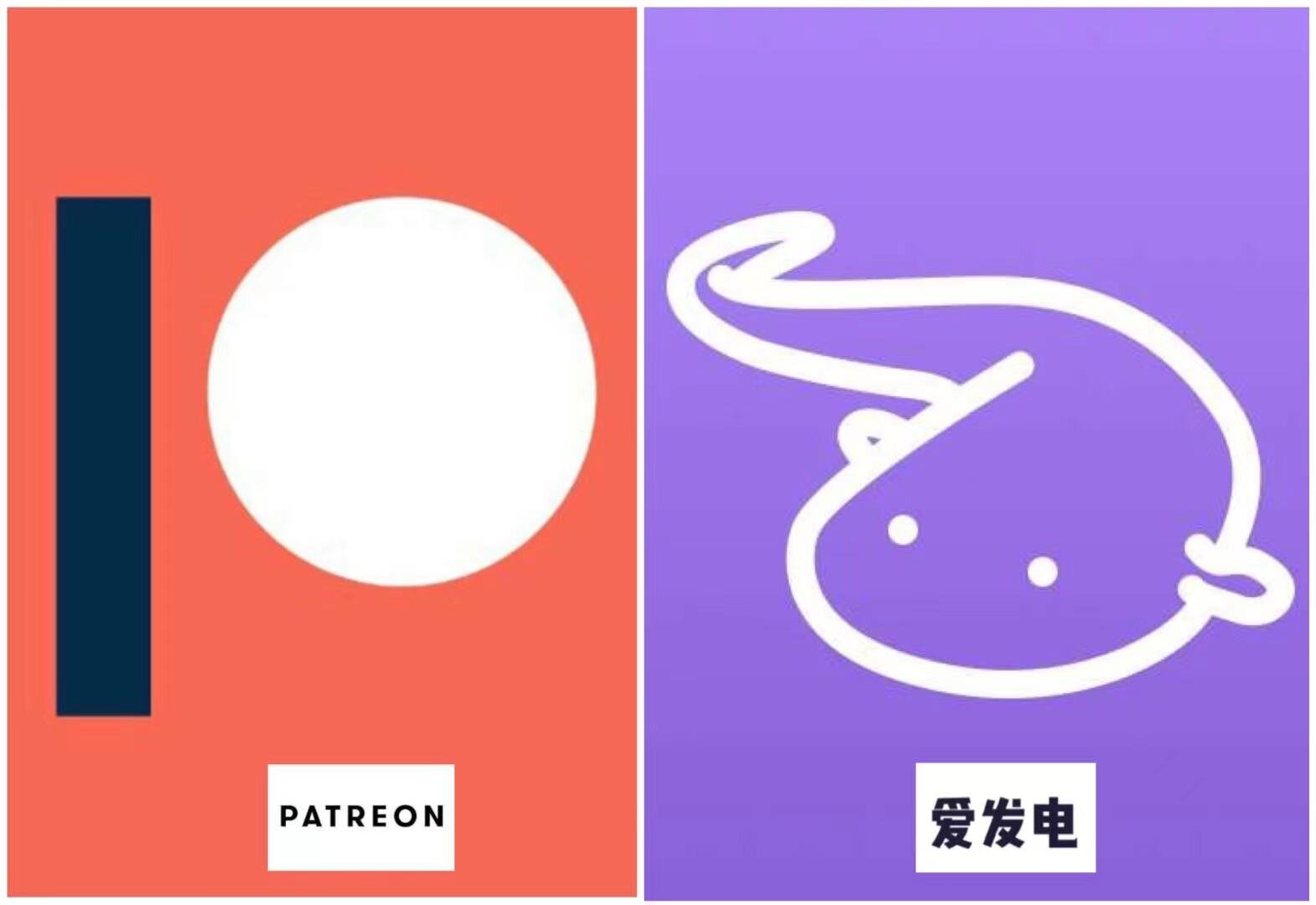
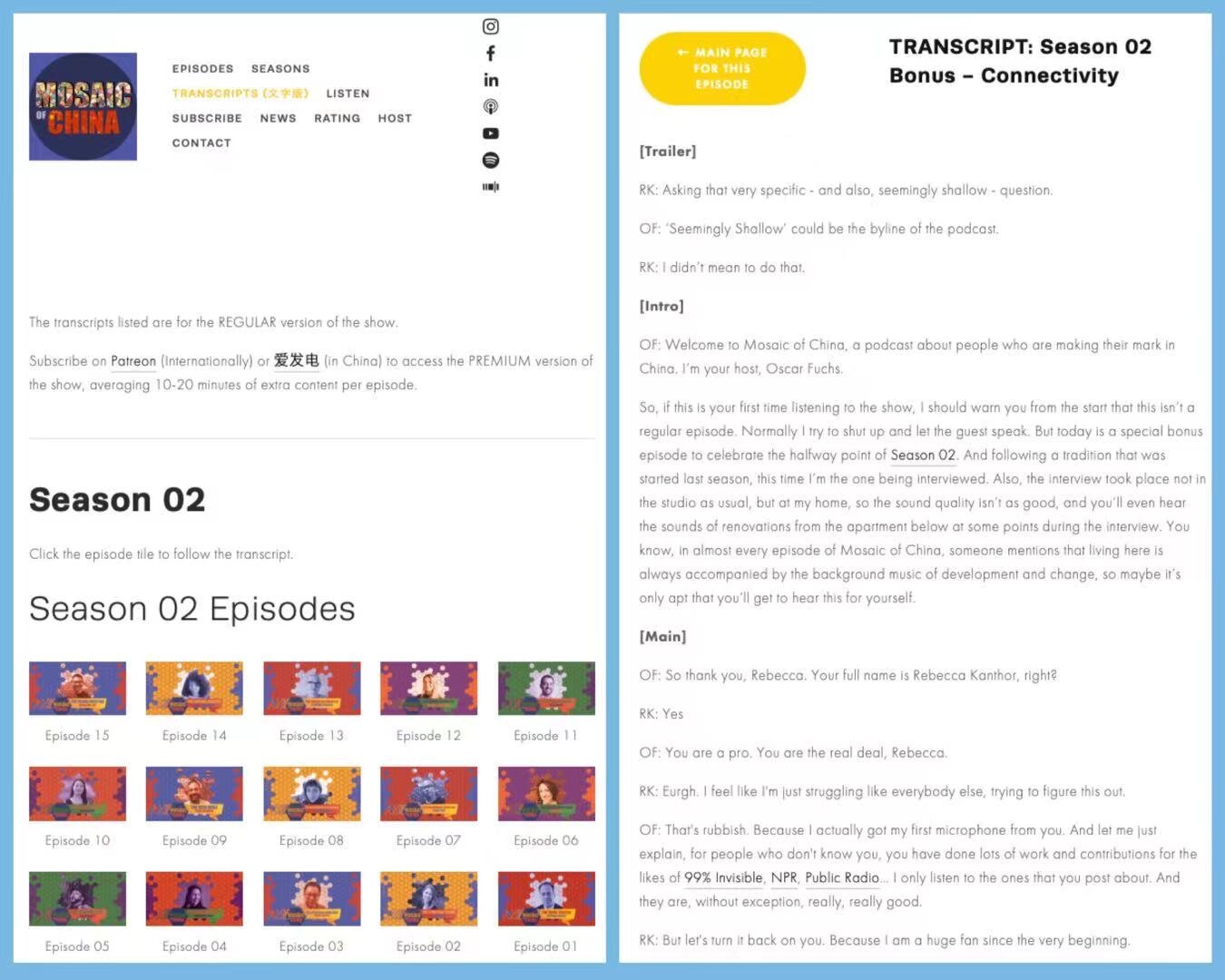
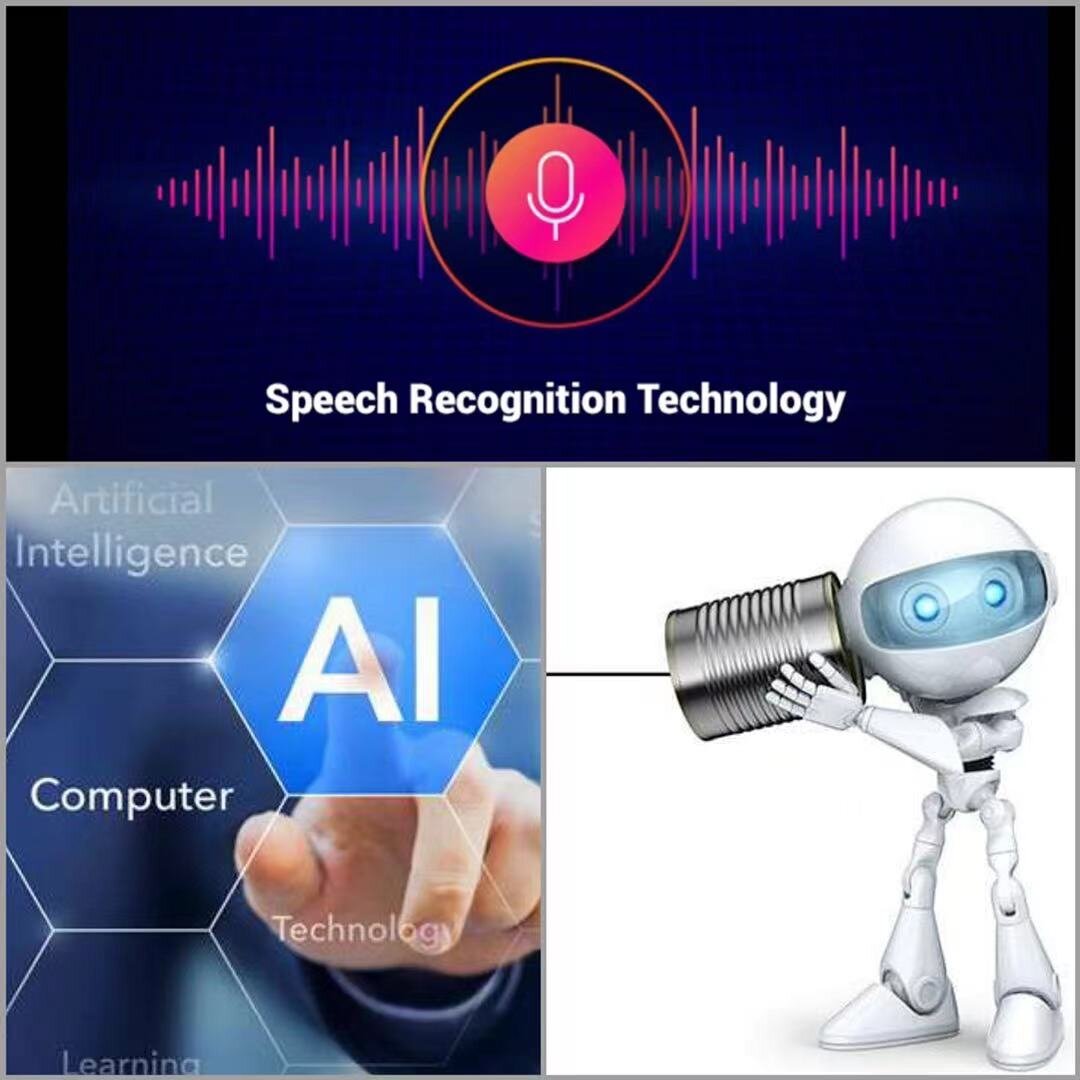
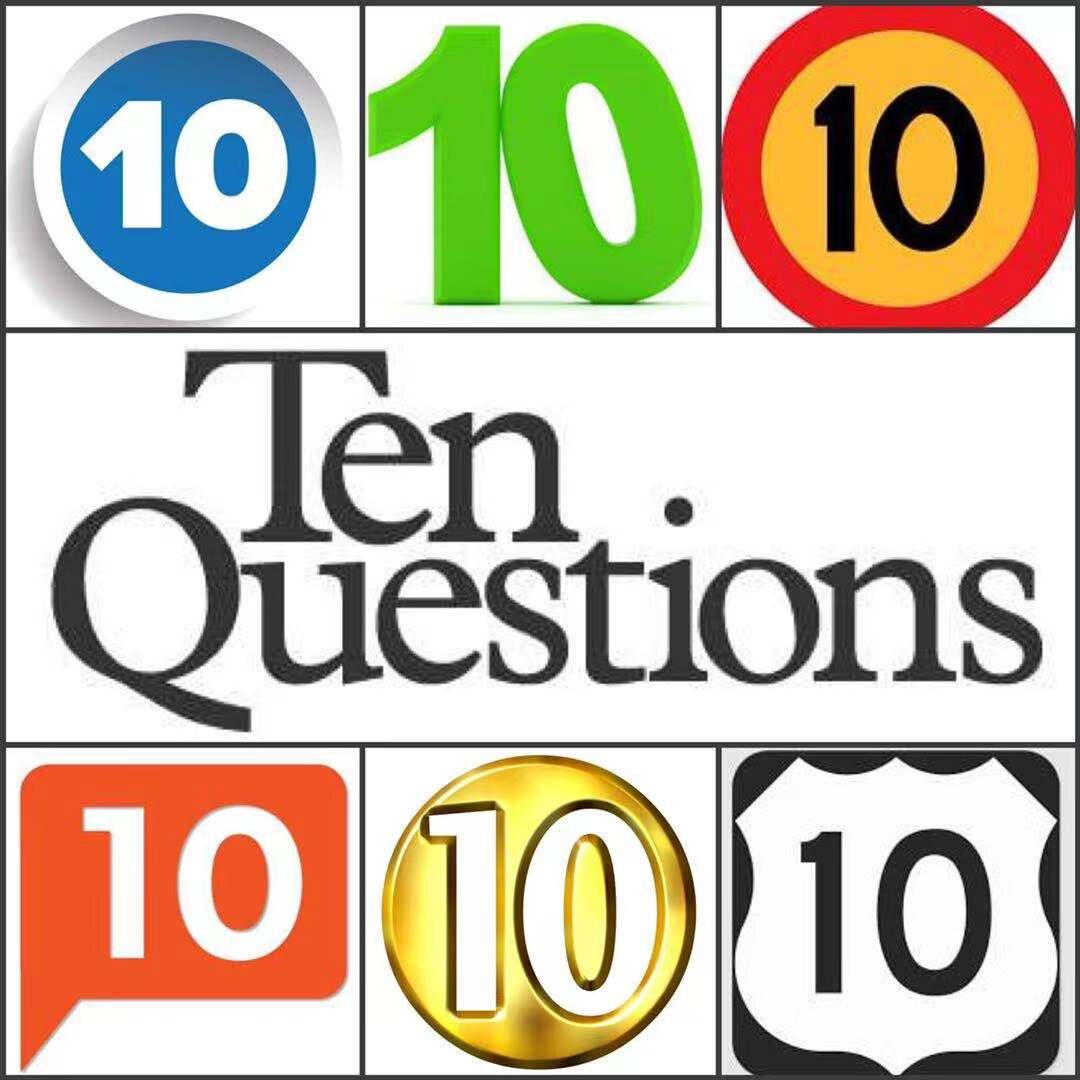
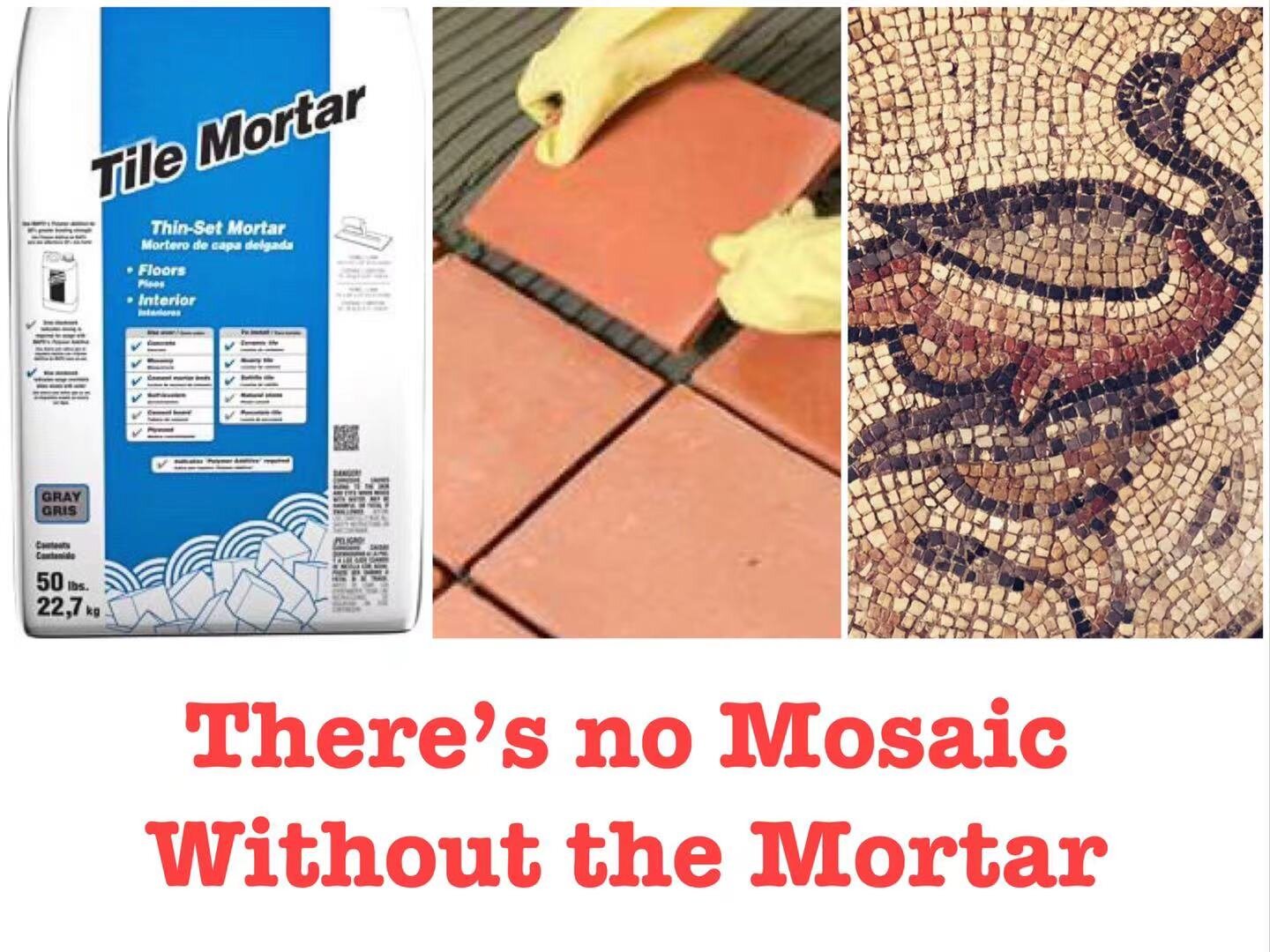
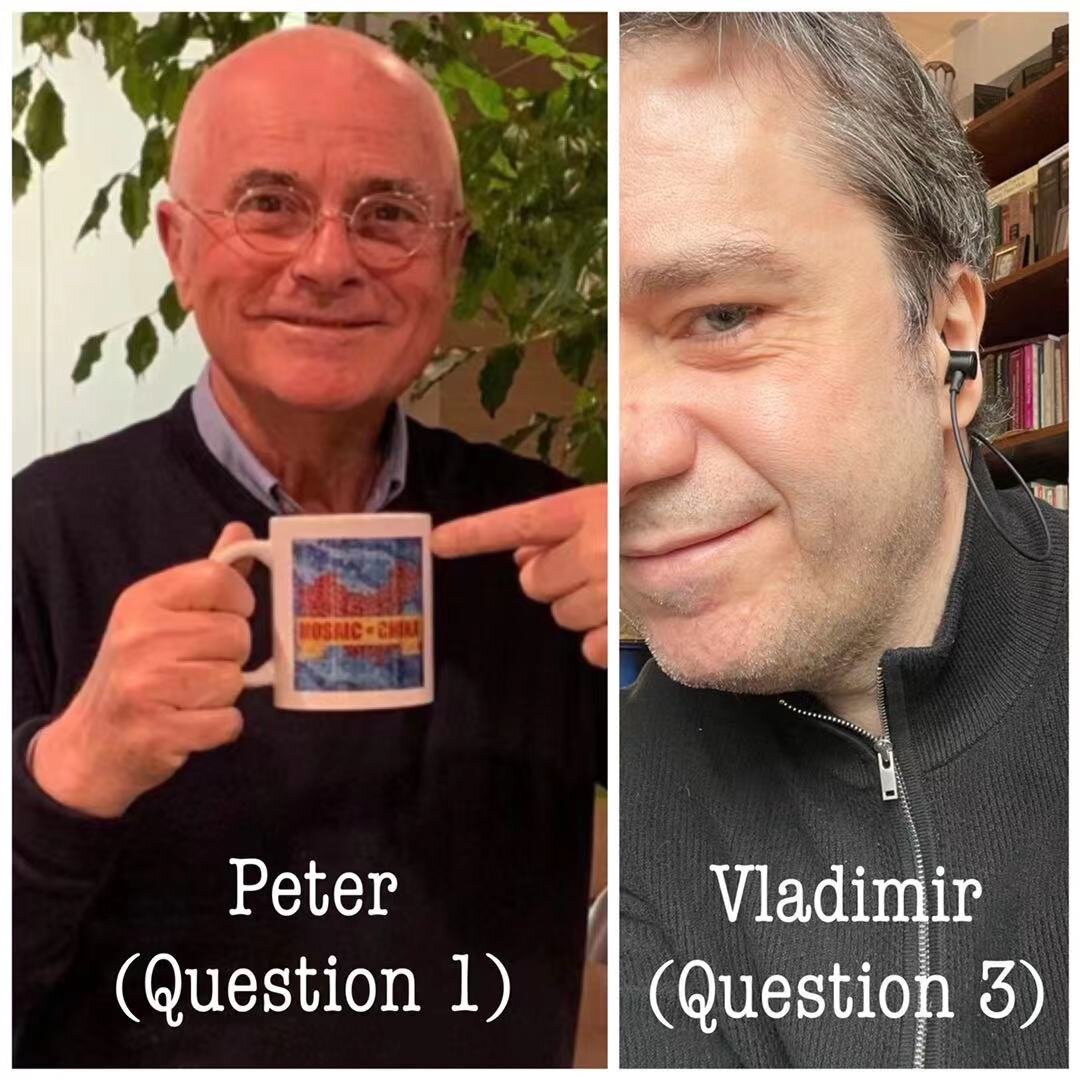
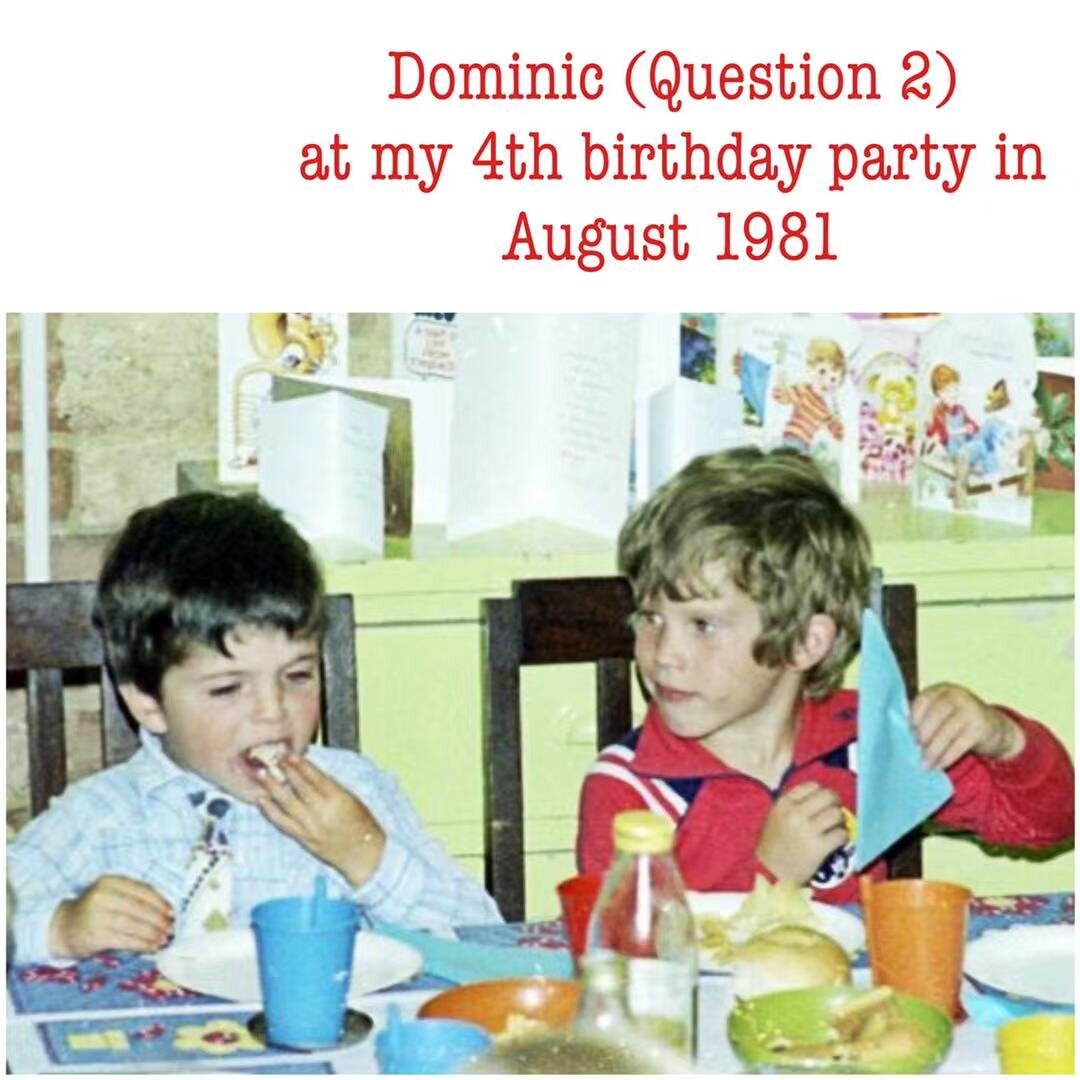
To Listen Here…
Click the ▷ button below:
To Listen/Subscribe Elsewhere…
1) Click the link to this episode on one of these well-known platforms:
2) Or on one of these China-based platforms:
To Read The Transcript…
[Trailer]
RK: Asking that very specific - and also, seemingly shallow - question.
OF: ’Seemingly Shallow’ could be the byline of the podcast.
RK: I didn’t mean to do that.
[Intro]
OF: Welcome to Mosaic of China, a podcast about people who are making their mark in China. I’m your host, Oscar Fuchs.
So, if this is your first time listening to the show, I should warn you from the start that this isn’t a regular episode. Normally I try to shut up and let the guest speak. But today is a special bonus episode to celebrate the halfway point of Season 02. And following a tradition that was started last season, this time I’m the one being interviewed. Also, the interview took place not in the studio as usual, but at my home, so the sound quality isn’t as good, and you’ll even hear the sounds of renovations from the apartment below at some points during the interview. You know, in almost every episode of Mosaic of China, someone mentions that living here is always accompanied by the background music of development and change, so maybe it’s only apt that you’ll get to hear this for yourself.
[Main]
OF: So thank you, Rebecca. Your full name is Rebecca Kanthor, right?
RK: Yes
OF: You are a pro. You are the real deal, Rebecca.
RK: Eurgh. I feel like I'm just struggling like everybody else, trying to figure this out.
OF: That's rubbish. Because I actually got my first microphone from you. And let me just explain, for people who don't know you, you have done lots of work and contributions for the likes of 99% Invisible, NPR, Public Radio… I only listen to the ones that you post about. And they are, without exception, really, really good.
RK: But let's turn it back on you. Because I am a huge fan since the very beginning.
OF: Oh, gosh. Looking at how you accept praise is exactly the same as how I accept praise, which is with incredible pain.
RK: Yeah. It’s cringe.
OF: I don't know what the answer is. But I knew that you would be the same. I knew it.
RK: I'm not just praising you. I'm praising that energy that you and the guests are creating together.
OF: I totally agree, I love that too. That's what keeps me coming back every week, it's the new guest, and what they can give to me, and give to, obviously, the audience beyond that. And that is the magic. I don't quite know how that happens, either.
RK: Yeah, it's something about putting two people in front of a microphone together, then something just happens. And just grabbing it and then going with it. You know, there's two different kinds of guests on Mosaic of China. One is someone I know what they're going to talk about. Like, the topic is something I'm interested in. And then one is like, I don't know who this person is, and I also don't know about their topic. I know I'm gonna like the first type, and so I always love those episodes. But then the ones that I don't really think is going to be something I'm interested in… But it always is interesting. And I always like “Wow” at the end of it, I think that's the exciting thing for me. It's like “I just didn't know that topic was going to be interesting to me”. And then all of a sudden, it does become something that I'm interested in.
OF: Honestly, that is what it's designed for. It doesn't matter if you think that you are an expert in something, or if you're interested in something. Everyone can get something out of every episode.
RK: Yeah.
OF: And again, it's not about me, it is about that magic that comes out in that interview.
RK: Right. And, like, sometimes things just… You go down an alley of a conversation, like "Oh, I did not know it was gonna go that way.”
OF: Right, right.
RK: That element of surprise is always… I just really enjoy that.
OF: This is the funny thing. So I experience it as a listener myself. Because by the time I'm listening to it, I've done the production side, maybe a year ago.
RK: Oh.
OF: I’ve done the interview, probably six months ago.
RK: Wow.
OF: And so by the time that I listen to it, I'm actually putting myself into the shoes of a listener at that point. So it's exactly the same.
RK: Yeah, and you know, sometimes I think we have a lot of need for instant gratification. You’re playing the long game.
OF: Mmm.
RK: It's just like, the points bringing this all together are really just… There are so many interesting connections.
OF: Actually, you said the word. You've said the word I wanted to touch upon here, which is the word ‘connections’. And that whole ‘connectivity’ side is what's really coming out of this season especially. Because this is when I think the project is starting to come into what it should be, because of the connectivity between Season 01 and Season 02. And you can sort of start to see this idea of the ‘Mosaic’.
RK: You’re reminding me of several times when I've heard you in Season 02 interviewing someone, and they'll give you an answer, and then you'll say “Well, that's funny, because someone in Season 01 said this.” Or maybe “This person said exactly the opposite”. I love that. It's pulling it all together.
OF: That's what I'm trying to do, not always successfully. You'd be surprised, there have been some connections where I did not pick it up in the actual interview. But I have at least three different chances to be reminded. Sometimes it's in the interview, sometimes it's in the edit, and then sometimes it's in the intro and the outro, at the time of release.
RK: Right.
OF: So I do have three chances to get it right. But even then, there are some that still slip by.
RK: So I was listening to this interview you did last season with Shannon Martin of PodBean. And you were talking with her a lot about ‘Community’. Has that concept changed in any way?
OF: I do think that maybe the concept of ‘Connectivity’ is a slightly more accurate one now than ‘Community’. I honestly think maybe I failed in that idea of community. I don't think there is one. And in fact, maybe the word ‘community’ is overused in general, like there's always someone who is saying “On behalf of the X and Y community…” And actually, is there a community? I mean…
RK: Yeah, that's a very interesting concept. I think ‘Connectivity’ is a much more apt term for what this podcast creates. Everyone can find an entry point to understanding somebody else's point of view. It doesn't make us a community. But it's such a valuable thing. First was ‘community’ now it's moved into ‘connectivity’, what's going on behind the scenes, the production side? And has it changed between Season 01 and Season 02?
OF: Yeah, it has. I have three different hats, which I understand more than perhaps when I was doing Season 01. Like, I know when I'm trying to do the pre-production side: I'm gathering people; I'm meeting them for a coffee; the kind of research side. Which then is forgotten about, when it comes to the interviewer side. As an interviewer, I look at the notes - which were written, maybe, a year before - as though it was a producer who I'm working with, who gives it to me, and I'm like “OK, I'm ready to meet this person, and do the interview” in a way that still feels fresh. And then when that side is done, with the time lag between the interview and then editing it, ‘Editor Oscar' has no feelings for ‘Interviewer Oscar’. And ‘Editor Oscar' has to listen to all the awful stutters that I make. So that is really interesting, having different phases, I can really see the different parts of the job in a way that I couldn't have before. It was all sort of entangled in my head in a big old mess. The biggest difference actually, is in the transcripts, believe it or not. So, this year I decided to write transcripts for every episode.
RK: You were going back and forth on this for a while.
OF: I was.
RK: I remember having these conversations with you.
OF: Right. And it is a lot more work. The positive side is that, now that I'm doing two versions of the show - I'm doing a long version, which is just for Patreon subscribers, and then I edit out 10 or 15 minutes for the free version - what the transcript has helped with, is that I don't have to listen and listen and listen. I can actually look at the interview, and I can edit it just by sight, which ends up saving me time. The transcripts are also really useful in that, if I have an issue with an episode - let's say, my host here in China has said to me on a couple of occasions that my podcast has contravened this regulation, or that regulation, and has been taken down - I can go back to them and say “Actually, I didn't say that.”
RK: Oh.
OF: “Here is the transcript. It's at this minute, this second”. And I've been able to appeal that and they’ve put it back on.
RK: No way!
OF: Yeah.
RK: Are you serious?
OF: Yeah.
RK: Wow. You're the only person I've heard that's been able to go back and prove that they didn't go against some regulation or something. OK.
OF: Yes, yes. I can say it, because I've got the transcript.
RK: Wow.
OF: So that ended up being quite useful. And it was really well handled by the Chinese host. They had an online chat function. So I could talk to somebody in real time. I could ask them “What was the reason that was taken down?” They say “Wait a minute”. They'll come back to me, and they say “It's because at this point, you said that”. I have the exact thing that they are not happy with. And I can counter that. And it was all polite. And they said, “OK, we'll lodge that. Our engineers will look at that and come back to you in a few days”. And lo and behold, it was put back on. And I just like the idea of having transcripts now on paper, where people who otherwise might have thought “I can't understand this podcast, it's spoken too quickly”. Anyone in the world whose first language isn't English… Now there's a way that they can listen to the show. And if I'm going to say that I am an inclusively-minded person, then actually I should have a transcript anyway…
RK: Yeah.
OF: …Irrespective of every other reason I've just said.
RK: Yeah.
OF: So I use an AI programme. So the AI programme does the first attempt.
RK: Yes.
OF: Right?
RK: I'm very familiar with this.
OF: Right?
RK: Yes.
OF: But for that, you have to either choose a Chinese AI programme, or an English AI programme. So I'm obviously going to choose an English AI programme. And then I have to correct all the Chinese. And then I have to format it, so that it's readable. I luckily have found an AI programme based in the UK, So I actually have UK English spelling, which is good.
RK: Nice.
OF: So that is one thing I don't have to correct. But yeah, for the time it takes, it actually has been very useful.
RK: Wow. You talked about introducing this Patreon. How else has starting this Patreon changed the way that you're working on, or producing the podcast?
OF: So I do do slightly longer interviews. And I've got more out of the conversation, more out of the relationship that comes out of that conversation, having now slightly taken a bit more time.
RK: Yeah.
OF: There’s value in everything, apparently.
RK: I always love hearing these things that you're learning as you go along.
OF: Yeah.
RK: Because it's a learning process. And you don't know what's going to work, or what the benefit of some change that you make is going to be, until… after you've made it.
OF: I thought you were going to say “until it's too late”, which has happened a few times.
RK: Yeah, well, that too. So the concept of the podcast, as you designed it - I mean, I remember hearing you talking about this - was that “OK, the person from Season 01 is going to connect me with the person to Season 02. And then we're going to go back to talk to the person from Season 01”. But we had a really strange year. And so, how did that affect the way you designed Season 02? What happened to those points of connection?
OF: Well, the project is only supposed to really capture you in a window of your life. The issue was that you have to be in China in that window. If you're not in China, and your life is not tethered to China at that point, then that's when the connection is lost. What I would say it did is, it allowed me to fill some gaps that otherwise I wouldn't have had. So of course, I'm grateful for that. And every new title in Season 02 is brilliant, you know, just the same as if they had been a referral. It's just the perfectionist side of me that would have loved, if there is a Season 11, for me to be able to trace that back to Season 01.
RK: Mmm, yes. So I thought that I was going to enjoy the interview portion of the podcast the most. And now what I'm finding is, yes, I do enjoy that. But I really enjoy the rapid 10 questions.
OF: Do you?
RK: I love it. And the reason is, I can have known someone for a long time or there may be a well known-person and I know of them. And then they answer, you know “What's your go-to karaoke tune?”, “What's your favourite phrase in Chinese?” And this story comes out of it.
OF: Yeah.
RK: And you wouldn't have ever gotten that answer any other way…
OF: Yeah
RK: …Except for asking that very specific - and also, seemingly shallow - question.
OF: Well, ‘Seemingly Shallow’ could be the byline of the podcast.
RK: I didn’t mean to do that.
OF: No, no!
RK: OK.
OF: I have a surprise for you. I actually asked a few Patreon supporters to nominate a few questions for today's interview.
RK: Oh.
OF: So let me put this in front of you.
RK: OK.
OF: Here are three questions that have been asked. And I haven't properly read them.
RK: OK, well, so this is for the Patreon subscribers. OK, so Peter Arkell asks “After having been a career advisor for others, what does your next career chapter look like after this major swerve into podcasting?
OF: Oh god. I think it's going to be more common for people to have more than one career. I think in the past, it has been this idea of “OK, I might change jobs, but I'll be in the same career”. Increasingly, I think people are going to have more than one career: two careers, three careers. I did a major swerve into headhunting, before that I was in market research. I was doing conferences, I was doing research reports for the Japanese government. And then you can sort of see how then the next stage in my career has been built off from that. So I see it as another transformation. And I think there'll be another one in the future too, I guess. And maybe the same goes for you. I don't think you would have predicted that this would be your career, maybe 20 years ago.
RK: Hmm, no. And I also see the directions that my life is going in as well.
OF: What’s your next career?
RK: Well, I'm doing kind of three at the same time. But I did want to say something. I love this updating with guests from before. Because you're right, all of our lives kind of are in flux. And so it is really fascinating to hear, you know, a guest from Season 01, how their life has changed, what they're thinking about these days, where their career path is taking them, and how the pandemic has shaped their life. You hear them in that one point in time and you think "Well, that's the way they are”. When actually, you know, everyone is going through changes, and it's really great to get an update and sort of hear how they are doing.
OF: Yeah.
RK: Maybe this entire time you've had this idea of ‘community’. And it's not the community of listeners, it's the community of people that you are talking to.
OF: Maybe. Yeah. Yeah. I think if you’re a tile in the Mosaic, no matter how you came there, you're going to be in that Mosaic, right?
RK: Right.
OF: Yeah. So maybe the Mosaic ‘tiles’ are the community, and is the ‘grout’ that is the connectivity. Oh, is that going too far?
RK: Oh, wow.
OF: Have I just called you ‘grout’?
RK: Yes.
OF: Maybe I have.
RK: Yes. Thank you.
OF: Because actually no. No, that is it. Because the tiles, they wouldn't stick without the grout. So it's the community of tiles, which are set in place by the connectivity of… what do you call it?
RK: Mortar.
OF: ‘Mortar’!
RK I would prefer ‘mortar’.
OF: ‘Mortar’.
RK: So another Patreon subscriber, Dominic Leeson, asks “Do you feel you have a particular affinity with the Chinese culture? And if so, what in particular, and where do you think that stems from?”
OF: Dominic is my oldest friend. We grew up together in northwest London. He now lives in Chester. And I haven't seen him since I was 11.
RK: Wow. Look at that point of ‘Connectivity’.
OF: Yeah. Yeah, exactly. We reconnected on social media a few years ago. And randomly he joined the group. And it has been the point of connectivity with us again. And he’s… He is the ultimate person I want to attract. He has no connection with China. No connection at all.
RK: Yes.
OF: But there's just that curiosity. And he stuck around. So thank you, Dominic.
RK: Wow.
OF: Your question is an interesting one. The answer is ‘no’. In fact, I would say I was scared of Chinese culture at the beginning. And so, no, it's not a natural affinity, it’s one that I have grown to love. And I guess that speaks to why I'm doing this, maybe. I haven't thought about it this way. But it's like, I can put myself into the situation of someone who doesn't necessarily have an affinity to China, and can make that a bit more comfortable for them to actually engage with Chinese culture.
RK: Mmm. But I think what Dominic's question is trying to get at is actually what Vladimir Valjarević is asking quite directly. So Vladimir asks “I'd be interested to hear how you decided to live in China long term. Was it spontaneous? Or gradual and well planned?
OF: Hmm.
RK: First of all, who's Vladimir?
OF: I don't know Vladimir. So, I mean, I'm glad you asked that, because at the beginning of this project - and probably you can relate to this as well - you’re very needy in terms of “Just give me some support here.” And now in Season 02, a big difference is that I am less needy about that. So I have many friends who have never heard an episode of the podcast, many family members, and that's fine. I really appreciate people like Vladimir, who have just heard about it, they’ve said that they enjoy it, and they then make the conversion to becoming a Patreon supporter. And that's great.
RK: Oh, wonderful. OK, so answer his question.
OF: No, it wasn't well planned. In fact, none of my career moves have been well planned. Oh, god, this is gonna sound terrible. But I moved to China for love. It wasn't financial, because I got taxed a lot when I came to China. But that was the reason I came. And it's the reason I'm still here actually. Oh dear.
RK: Well, that’s why I'm here too.
OF: Yeah, right.
RK: You know. I’m OK with that, because I like being here.
OF: Yeah.
RK: But it seems actually quite fitting that you came here because of another connection.
OF: You've done it. You have managed to find the way to end this interview. Thank you so much for coming over. I really appreciate you, Rebecca, thank you so much for listening, and for being you.
RK: Oh, it's really lovely to just have a conversation with you. And I'm a huge fan. See, I'll say it!
[Outro]
OF: Thank you to Peter, Dominic and Vladimir for submitting those questions. Sorry that I didn’t prepare better answers, I purposefully didn’t think about them until the interview and… well, you heard the results. But I was inspired by my conversation with Rebecca, and this new concept of ‘Mortar’ - this idea of listeners being the connective cement, without which the tiles of the Mosaic simply wouldn’t stick - is something that I will definitely be incorporating into the future of the show. So if you’re a subscriber on Patreon - or the equivalent in China, 爱发电 - then you can expect to be more involved in the run-up to Season 03 of the show, which I’ll start working on later in the year. I’ll post previews there of who I’m about to interview, so that you can submit questions to the guests directly. And I’ll also try to do more at the time of release. So a big thank you to Rebecca for helping to come up with that idea during our chat.
But back to Season 02, we still have 15 more episodes coming your way, and I’m really looking forward to sharing them with you. But I’m actually going to take another couple of weeks off. The weather is getting warmer in China, so I’ve decided to do some travel before coming back to you with the second half of the season. So please catch up with any of the episodes you may have missed, and I’ll see you again in May.
